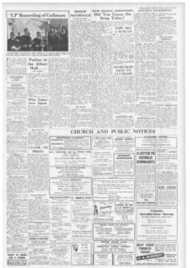Page 3, 7th March 1958
Page 3

Report an error
Noticed an error on this page?If you've noticed an error in this article please click here to report it.
Tags
Share
Related articles
Poetry
‘philosophy Undermined My Atheism’
Poetry
Verse, New And Less New
Their Own Best Advocates
Michael Roberts 1902-48
COLLECTED POEMS, by Michael Roberts (Faber, 15s.).
MICHAEL ROBERTS first distinguished himself as a poet and editor during the thirties. His last book of poetry, "Orion Marches", came out in 1939, and in the few "Last Poems" that he wrote after that (included in this collection) there are phrases which recall the early Auden, Spender, MacNeice and Day Lewis: "Here is the ash of history"; or: "Poverty has no grammar."
I do not wish to infer that there was no development after the war, since one of his best poems was written in 1946 about Tignes, the French village that was flooded six years later to make a darn. And another, of about the same period, develops an earlier idea of his about angels as the agents of change, the bringers of death to the old order and life to the new: " Angels breed darkness out of light . . . Angels are the launching of a new ship . . ."
Yet his greatest development was as a prose writer. " The Recovery of the West" (1941) and " The Estate of Man," incomplete and published posthumously in 1951, showed him to have advanced as a thinker far beyond many of those that he had sponsored in the "New Signatures Group " of 1932; for his leadership then, during the thirties, had run primarily along the lines of editorship.
Mountains N-EVER have I come across a better introduction to poetry than his to the " Faber Book of Modern Verse " (1936) which, if it contained a good deal of Left-wing work, also pointed the way to the Christian renaissance that had already begun to show itself in the work of such young poets as David Gascoyne and Dylan Thomas. If he was fully aware of the poverty in Jarrow, Moseley's ominous movement and Hitler's anti-semitie policy, it should be remembered that he was an amateur mountaineer of distinction.
Mountains teach men to look apwards and, if the shackling of fire and water to taps and switches has tended to take away from their power as symbols, then the power of mountains has remained unchanged. " His days on [them] were the poetry of his life . . In them he [could find] intelligible shapes for his deeqest impulses and visions."
So writes Mrs. Roberts in an introductory memoir, which is a model of its kind, and deserves to have the last word here.
NEVILLE BRAYBROOKE
blog comments powered by Disqus











